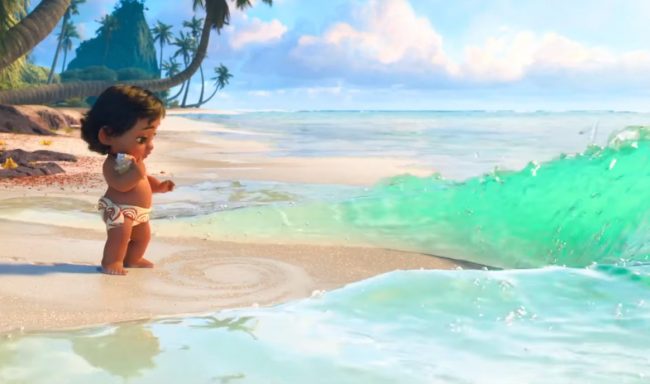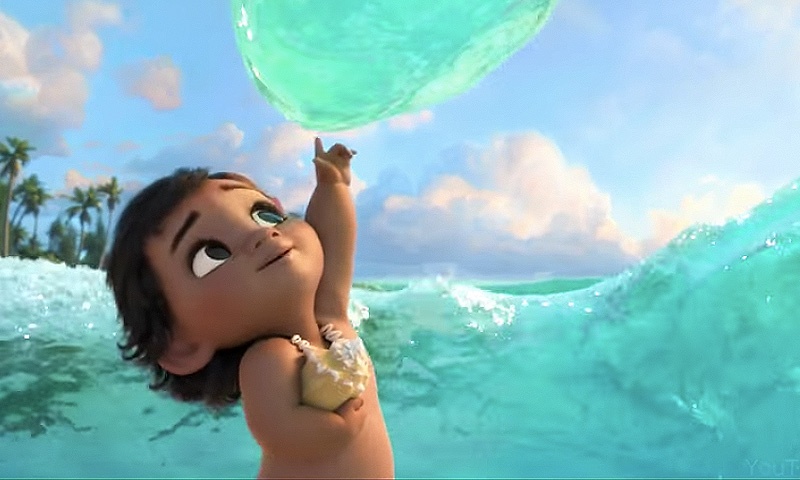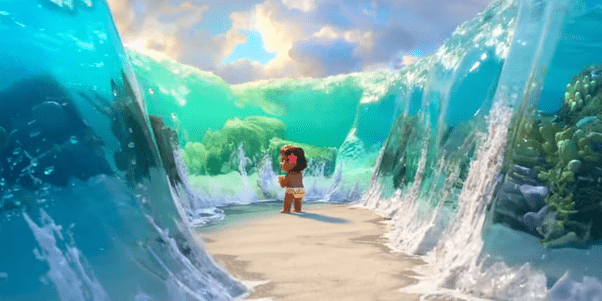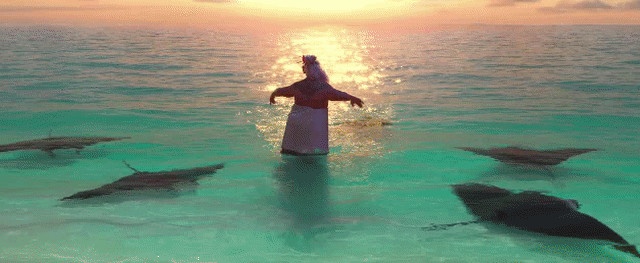I watched Moana twice this weekend. First on Friday night to pre-screen and determine whether it would be too scary for the kids. Then on Saturday afternoon I watched it with the kids. There were a few tense moments when one or more children left the room, but they really loved the movie.
At first I was a little bothered by yet another instance of the teenaged daughter defying her father’s authority to follow her heart and to go to on the forbidden adventure. But as I watched the movie a second time and thought about it and talked about it, I realized that Moana was actually breaking the mold and overturning that trope. Superficially it might seem that Moana is yet another Disney princess rebelling against her parents; but something more is going on. Her father wants her to stay on the island where it is safe, her heart tells her that she needs to sail beyond the reef to the open ocean. But where Ariel the little mermaid suffers from a superficial fascination with the world above the sea and an infatuation with a prince she hardly knows, and Belle wants something more than her provincial life, Moana has something more than a longing for adventure and exploration, she has a calling, or you could even call it a vocation.
The film opens with Moana’s grandmother telling the story of Maui stealing the heart of Te Fiti and awakening the lava demon Te Kā who defeats him. Maui loses both the heart stone of Te Fiti and his magic fishhook. The darkness spreads, bringing death and destruction, threatening to take over the world. All the other children cringe in fear at the darkness and the monsters, but little Moana listens wide-eyed, smiling, gleeful. The story has spoken to her heart. She has heard her call: to fight the darkness, defeat the monsters, and to restore order to a chaotic world.
The calling is confirmed when she wanders down to the beach while her father is still comforting the other children. First, we see little Moana’s compassion for the little turtle who she shepherds to safety in the sea, protecting it from the birds who would eat it. This is an important moment in understanding her character and in understanding the exhortation she hears to know her own heart. Moana’s heart has nothing to do with fairy tale romance and handsome princes. She has the heart of a shepherd, a guardian, a protector of the weak and helpless against the powerful and rapacious and that make her a true princess.
Then, almost as if in response to her rescue of the baby turtle, as if in recognition of her goodness and courage and compassion, the sea calls to her. At first it seems to be luring her to her destruction with a series of alluring conch shells as she moves out further and further into the deeps. This is a frightening scene until the benevolence of the ocean has been established. There are real dangers in the ocean and Moana is in over her head, literally. Only the benevolence of the ocean protects her. The scene calls to mind the story of the Five Chinese brothers where the brother swallows the sea and the foolish child ventures further and further out until the brother can no longer contain the sea and he spits it back out and the child is drowned.
And yet Moana is not drowned. Instead, she is given a gift, the lost heart of Te Fiti. And this moment, which she later thinks was just a dream, is the moment of her true calling. Her grandmother, who witnessed the scene, which was interrupted by Moana’s father swooping in to carry her away from the dangerous water, rescues the heart stone and keeps it safe until the moment of crisis arrives and Moana is old enough to set out on her quest.
Moana’s choosing is not a random whim of the sea. She isn’t the chosen one because of who her parents are or because she has innate magical powers like Harry Potter. But it is rooted in a recognition of who she already is: the wide-eyed dreamer who fears no danger, who cares for the weak, who accepts the mission in her heart even before her head understands what she is called to do. The call originates with her grandmother’s stories and her response to them. It is a call rooted in her belonging to her people and in their very nature as people of the sea.
As she grows Moana feels called to the sea and is torn between her two, apparently contradictory, callings: the call to follow her father, to lead her people as their chief, and the call to something she can’t quite understand, the call of the horizon and the open ocean and adventure. She truly wants to do her duty; she doesn’t quite understand why she can’t be content in the role her parents have set out before her. And yet, this doesn’t come out as willfulness and defiance, but as a genuine existential distress because she does love her parents and wants to honor them, and she does love her people, and wants to serve them.
The difference between Moana and Ariel and Bella is seen in the details of their “I want” songs. Ariel wants to be part of that world:
Up where they walk, up where they run
Up where they stay all day in the sun
Wanderin’ free – wish I could be
Part of that world
What would I give if I could live out of these waters?
What would I pay to spend a day warm on the sand?
Bet’cha on land they understand
Bet they don’t reprimand their daughters
Bright young women sick of swimming
Ready to stand
It’s essentially a self-serving call and it reveals the typical rebellious teen over-reacting against an over-protective father.
Belle can’t even really articulate her desire as much as Ariel does. Is it for Prince Charming? She’s not sure. “There must be something more than this provincial life,” she reiterates.
But Moana’s isn’t about want or desire, it’s external though she hears it in her heart, it’s something more than just rebellion. She wants to be the perfect daughter and doesn’t know why her heart is restless:
I’ve been staring at the edge of the water
‘Long as I can remember, never really knowing why
I wish I could be the perfect daughter
But I come back to the water, no matter how hard I try
Every turn I take, every trail I track
Every path I make, every road leads back
To the place I know, where I can not go, where I long to be
See the line where the sky meets the sea? It calls me
And no one knows, how far it goes
If the wind in my sail on the sea stays behind me
One day I’ll know, if I go there’s just no telling how far I’ll go
It’s not “I want,” or “there must be,” it’s something more profound.
At one point Moana complains to her mother that her father doesn’t understand her— aha the Ariel moment, daddy just doesn’t understand!— but her mother gently corrects her: her father does understand the call of the sea; he felt it himself when he was younger. But when he defied the laws of the tribe and attempted to sail beyond the reef in search of adventure his friend paid the price and lost his life. Her father’s fears are not groundless and the rules are not arbitrary. The danger beyond the reef is genuine and the spreading darkness is real. We later learn that even the benevolent sea will not protect Moana from all the dangers of storms and pirates and monsters.
When the moment of crisis arrives, the renewal of Moana’s calling comes not in an act of rebellion but in humility and deference. When she attempts to sail out beyond the reef to look for new fishing grounds on her own without telling anyone she fails and she almost loses her own life and the life of her pig friend, Pua. After that failure she reluctantly gives up her quest, recognizing that it is beyond her ability. She concedes that her father was right. But then when she listens to her grandmother and learns about her people’s history as voyagers and is told the story of the receiving the heart stone, she realizes that she does have a genuine call. Then her response to that call is not to set out to adventure on her own again. Rather, she tries to convince her father and the rest of the tribe to come with her to restore the heart of Te Fiti. Only when her father’s fear closes him off from an understanding of her calling and leads him to threaten her mission, only then does she run away. And even then only after her grandmother orders her to go with her dying breath. She has learned her lesson that rebellion is not the same as vocation.
It is genuine self knowledge and the humility of acknowledging her limitations and her deference to her grandmother’s authority, not petulant self indulgence, that leads to her stealing the boat and leaving the island. Her mother tacitly acknowledges that Moana is in the right and her father is not by giving Moana a bag of food for her journey.
In this case the women have the ability to see more clearly, to see beyond fear and into the heart of duty; but this is not because Moana’s father is a buffoon or a whimsical authoritarian tyrant. He is a genuinely good leader who has a completely human and understandable blind spot. He is doing his duty as best he knows to protect his daughter and to serve his people, his naturally protective parental love and his fear rooted in his past experience overwhelm his duty to his people and he fails to see clearly.
As she sails away across the ocean Moana practices over and over the script her grandmother has given her: “I am Moana of Motunui. You will board my boat and sail across the sea and restore the heart of Te Fiti.” The repetition of the lines reminds me a bit of Inigo Montoya in The Princess Bride constantly practicing the script he will say to the six fingered man who killed his father. The sense of determination and mission is similar, too, as is the child’s fear at facing the powerful figure who must be confronted. The script gives her courage just as it does for Inigo. Moreover, the script is a constant reminder of who she is. She is Moana of Motunui, her identity is rooted in her place of origin, in her tribe. She is Moana with a mission, sent by the elders of her people. This is about as far from rebellion against family and authority as you can get.
She still thinks that it is Maui who will restore the heart of Te Fiti. Her job is just to find Maui and to deliver him to Te Fiti. He will do the rest. But just as Frodo discovers at the Council of Elrond that his mission as ring bearer is not destined to end at Rivendell but will carry him all the way to the cracks of doom, Moana eventually realizes that she must carry out the mission on her own. Maui abandons her, gives up on the quest, and she must face the terrible lava god alone with only her faithful companion Heihei, who isn’t nearly as resourceful as Sam Gamgee, but who does play an important role in protecting the stone and carrying it for Moana when it becomes necessary. It turns out that Maui’s role is closer to that of Gandalf. He is the mentor who teaches Moana sailing and navigation, aka wayfinding. And in the end he does return to help distract Te Ka for just long enough for Moana to discover the truth about Te Fiti. But it is Moana who has the insight to realize that Te Ka is truly Te Fiti and who discovers how to restore the goddess’ heart. Maui couldn’t have done that because he relies on his strength and cleverness where Moana has learned to rely on her heart, her intuitive knowledge of the deepest nature of things.
And that is the secret of Moana’s truest self. Who she is is not just a leader and an adventurer. She has the gift of seeing hearts. She sees that the heart of her grandmother contains wisdom and understanding and right judgement and that the tales she tells reveal the deepest truths about the world. She sees the heart of the ocean and knows that it is a benevolent spirit who is calling her to her true vocation. She sees the heart of Maui and knows that he will only help her out of a selfish desire for adulation. (Though later he becomes more than that, inspired by Moana he finds his true heart, the heart of a selfless hero who risks everything to save Moana from Te Kā.) She sees the heart of Te Kā is really Te Fiti, the life giving goddess who had lost her way. And she sees into the heart of her people and knows that they too have lost their way, they are meant to be voyagers. She has the gift of knowing who she is and of helping others to know who they are, to become their best selves. The self knowledge that Moana has is true knowledge of the heart of reality. It is a mythopoetic knowledge, the knowledge that stories reveal our deepest selves to ourselves.
Go to Part 2: Moana’s Mythopoetic Journey







Oh, you have reminded me of how very much I loved this movie and articulated perfectly why Is is the opposite of selfish rebellion. Every time I start to hate Disney they pull me back in with something wonderful. For my older children, I was happy to have this example of how sometimes well meaning adults/parents can be wrong, but that it is important to exhaust the opportunities for obedience first.
“sometimes well meaning adults/parents can be wrong, but that it is important to exhaust the opportunities for obedience first.”
That’s a great formulation of the principle.
[…] (see Part I, Moana and the Calling of Vocation ) […]
I have a bone to pick with this blog. “At first I was a little bothered by yet another instance of the teenaged daughter defying her father’s authority to follow her heart and to go to on the forbidden adventure” First, I don’t think it’s “superficial fascination” for ANYONE, to want to live their own life on their terms. “It’s essentially a self-serving call and it reveals the typical rebellious teen over-reacting against an over-protective father.” This is where there is a disconnect between what adults THINK is best for their children and what actually is. Stifling anyone’s dreams will always result in rebellion. Ariel was being forced into living a life she did not want for herself.
Also, Belle?? “Belle can’t even really articulate her desire as much as Ariel does. Is it for Prince Charming? She’s not sure. “There must be something more than this provincial life,” she reiterates.” Belle went off to SAVE her father then sacrificed her freedom to save his. To say she was a self-serving superficial teenage girl is insulting. Just because she wanted more, wanted to live the adventures she reads about, does not make her rebellious or bucking authority, it makes her HUMAN. AND IT HAD NOTHING TO DO WITH A MAN (Prince Charming? That’s Cinderella not Belle.)
It seems more like this blog is about the author’s own morals, ethics, and views and what young females should or shouldn’t do in regards to their parents than actual facts of Disney movies. And it comes across as a very archaic, outdated, and offensive to women. But, that’s just my feminist opinion.
Hi, I’m the author, Melanie. You can talk directly to me, you know? Because this here, where you’re commenting, it’s my blog. And I wrote it.
And yeah, this was a blog post I tossed off in a couple of hours after watching a movie, so it’s not super polished. I was roughing out some ideas off the top of my head. I used Belle, frankly, not because she’s the best example but because I don’t remember a lot of the Disney canon all that well. Beauty and the Beast is probably one of the princess movies I remember the most clearly, having seen it more times and more recently than most of the others (and that’s still more than ten years ago). There are probably better examples for teen rebellion. Like Merida or Mulan. But Belle’s song was the first thing that came to mind as another example of the classic “I want” song to parallel with Ariel’s and Moana’s. I know it better than the songs from the other movies so I just went with it. My point really, which I didn’t flesh out more because this was really a blog post about Moana not Beauty and the Beast, was that Beauty and the Beast worked better in the original fairy tale where Belle has a real, specific desire, not a vague “something more” and where her sacrifice for her father is much clearer. I bring up Prince Charming, by the way, because Belle mentions him in her song: ”Oh, isn’t this amazing?
It’s my fav’rite part because — you’ll see
Here’s where she meets Prince Charming
But she won’t discover that it’s him
‘Til chapter three!”
It’s about the only thing in her song that provides any kind of vision for what the “something more” might look like: a girl meeting Prince Charming. So it’s left to the reader to extrapolate that Belle might also be waiting to meet Prince Charming too.
I agree that wanting more doesn’t make Belle rebellious. I do think it makes her something of a stereotype, it seems like Disney only knows how to write young women who are dissatisfied. I suppose satisfied girls don’t go on adventures, though, so maybe they think it’s necessary. But in the original fairy tale Beauty is a homebody who is quite satisfied with her lot in life. While her sisters complain about their father having lost his fortune and moan about living a quiet provincial life, Beauty makes the most of it. She actually dreads going back to the posh life they had before. She’d be much happier tending her garden in the country. I actually find it annoying that Disney eliminated the sisters and attributed their motivations to Belle. It completely changes her character and the story.
As for “superficial fascination” I think you’re misreading my intent. I’m contrasting a self-centered desire to live life on one’s own terms with a sense of vocation, a mission to live life for others. Ariel’s problem is that she wants to be something she’s not. She’s fixated on being a human. She’s a mermaid. To remind her of that fact isn’t stifling her dreams, it’s bringing her back to reality. Yes, her father is overbearing and the way he addresses her rebellion is terrible. But that doesn’t mean that he’s wrong in that her proper place is under the water and not on land. It is only by denying who she is that Ariel can live on land. She has to give up her voice and her tail (the fact that it’s a wicked witch who convinces her to give up her voice and tail is a big clue that she’s not on the right path, villains aren’t usually known for telling the truth). Wanting to live life on your own terms isn’t always possible. Sometimes we create unreasonable “terms” for ourselves. And part of the role of a parent is to help a child to navigate between those dreams which are impossible and those which are achievable. Ariel’s father fails at this. Moana’s mother and grandmother succeed. And eventually her father comes to realize that he was wrong. (Of course a huge part of my critique of The Little Mermaid is that Disney strayed from the original tragic ending of the Hans Christian Andersen fairy tale where the prince does not fall in love with the mute mermaid and she is doomed to die except for the fact that her sisters sacrifice their hair to the witch to get a knife with which she’s supposed to kill the prince and his bride. She refuses and in doing so gains the opportunity to win an immortal soul. It’s a much more satisfying story because it’s consistent. Disney made a hash of it by shoehorning it into a happy ending, making it something it was never meant to be. Hmmm, rather like a mermaid who wants to be human? Maybe there’s something to that.)
Another example of how this dynamic plays out is in Brave. Merida’s mother is partly right in pointing Merida to her duty as princess to lead her people and to be a peacemaker among the feuding tribes. She’s wrong in thinking there is only one way to achieve that goal and in thinking that Merida has to give up who she is and become a clone of her mother in order to achieve that goal. In the end the two of them compromise and find a way forward in which Merida gives up some freedom to take on the role of leader, but her mother allows her to figure out what that’s going to look like for herself.
And yeah, this is my blog. It’s about my own worldview, not yours or anyone else’s. What else could it possibly be about? That’s what a blog is: a place where to hash out ideas about ethics and morals and, yes, even views about what women should and shouldn’t do. I’m not really a Disney fan and I’m not going to love everything that Disney makes. I’m a critical reader and viewer and I like to write about movies in relation to literature and faith, not to take them on their own terms but to consider them on my terms.
I’m a mom raising three daughters, I spend a lot of time thinking about what kind of young women I hope they grow into and what kinds of books and movies will help to shape their characters. I hope that they won’t be the kinds of girls who rebel for the sake of rebelling or who chase after false and damaging images of self, or who always consider their parents an obstacle to fulfilling their dreams; but instead I hope they will be the kind to listen to the wisdom of their elders and to the voice of their heart and above all to the call of God in their lives and to find their own way in the world as strong women who can stand on their own feet but who also know when to ask for help and when to give it. In short, of all the Disney heroines I’ve met, I think Moana is the one I most hope to see reflected in my daughter’s choices and lives as a strong women who doesn’t reject tradition and faith and family and who always listens not only to her own heart, but also to her grandmother’s words of wisdom.